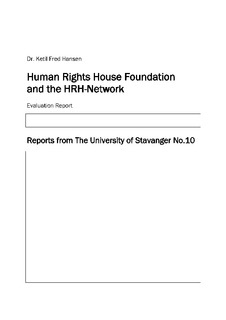Human rights house foundation and the HRH-network : evaluation report
Research report
Permanent lenke
http://hdl.handle.net/11250/226785Utgivelsesdato
2006Metadata
Vis full innførselSamlinger
Originalversjon
Hansen, K.F. (2006) Human rights house foundation and the HRH-network : evaluation report. Stavanger : Universitetet i StavangerSammendrag
Human Rights House Foundation (HRH-F) was created with a mandate to help establishing
Human Rights Houses in other cities. In 1994 four Human Rights Houses (Oslo, Moscow,
Warsaw, and Ljubljana) created a network for Human Rights Houses with the HRH-F in Oslo as
its secretariat. While establishing new HRH and elaborate the network has always been part of
the mandate of the HRH-F, it is only the last 6 years this has been its prime goal.
Since the creation of the network in 1994 one HRH has quit the network (Ljubljana), while two
newly established Human Rights Houses have joined the network (Open Word in London and
Rafto in Bergen). In addition, HRH-F together with a few HR based NGOs in Sarajevo
established a new Human Rights House there in 1998; a house that became member of the
network at its creation. Thus, in January 2006 the network consisted of 6 existing Human Rights
Houses. Adding up to these 6 houses are the 8 Human Rights Houses presented by the HRH-F in
January 2006 as emerging Human Rights Houses (Baku, Bogota, Istanbul, Kampala, Minsk,
Nairobi, Tirana, Zagreb).
To improve collaboration between HR NGOs within the Human Rights Houses (both existing
and emerging) but also having in mind that HRH-F has not finalised any new Human Rights
House since 1998, this evaluation was decided undertaken. Thus, the main goals of the evaluation
have been to find strengths and weaknesses with the Human Rights House as a concept, and with
the networking between the different associated NGOs. In addition, and as important, has it been
to find reasons for the difficulties in finalising new Human Rights Houses and look into the
priorities of work at the secretariat. In short, the evaluation should answer what the added value
of establishing Human Rights Houses is, what the secretariat can contribute with and how its
work can be made more efficient.
